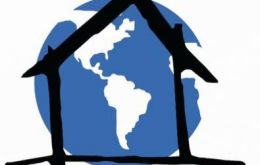MercoPress. South Atlantic News Agency
Economy
-
Friday, September 25th 2009 - 02:09 UTC
Catholic Church blasts “irritating” Argentine government numbers on poverty

Argentina’s Catholic Church considers “irritating” the argument that poverty had diminished in the country when it is plain evidence that this is not the case, “rather the contrary”. It is indignant for Argentina that the system should consider the excluded as “a variable of political success”.
-
Friday, September 25th 2009 - 00:58 UTC
MIT poverty investigation centre opens in Chile

The Jameel Poverty Action Lab (J-PAL) will open its new Latinamerican headquarters in Chile next Monday, Sept. 28. J-PAL is an organization that investigates poverty and is headquartered in Cambridge, Massachusetts at the Massachusetts Institute of Technology (MIT) Department of Economics.
-
Thursday, September 24th 2009 - 11:59 UTC
Argentina’s industrial production showing signs of recovery

Argentina's industrial production index in August rose 1.4% on the month, but was down 4.7% on the year, the Foundation for Latin American Economic Research, FIEL, said in a report released Wednesday.
-
Thursday, September 24th 2009 - 11:50 UTC
Beef export peak forecasted in Argentina for 2009

Argentine exports of refrigerated beef reached 34.923 tons in August equivalent to 131.2 million US dollars, according to official data provided by Senasa (Animal Health National Service).
-
Thursday, September 24th 2009 - 11:45 UTC
Chile’s fresh fruit exports hit by weak international markets

Weak international markets led to a 6% drop in the value of Chile’s fresh fruit exports this past 2008/2009 season, reported Fedefruta President Rodrigo Echeverría this week in Santiago.
-
Thursday, September 24th 2009 - 10:59 UTC
Peru blasts military expenditure and arms purchases in Latinamerica

Peruvian president Alan García demanded Wednesday that the Organization of American States, OAS, help contain the arms purchasing spree in Latinamerica, an issue that has created irritation and disputes among several countries of the region.
-
Thursday, September 24th 2009 - 10:53 UTC
Bank of England minutes reflect “uncertainty” and fears of inflation

Inflation in the United Kingdom has proved more stubborn than expected and is now no longer estimated to fall below 1% this autumn, according to minutes from the Bank of England's rate-setting committee. But there is still a lot of uncertainty about the economy and the impact of the ongoing reluctance of banks to lend.
-
Thursday, September 24th 2009 - 09:06 UTC
Barclays’ upbeat about Latam’s “remarkably strong” recovery in 2010

Latin America’s economic recovery will be “remarkably strong,” bolstering currencies and spurring interest rate increases in 2010, Barclays Plc said.
-
Thursday, September 24th 2009 - 05:44 UTC
Fed: the US economy is “picking up” but we’ll continue to pump liquidity

The US Federal Reserve said that even when economic activity is “picking up”, it expects to keep interest rates close to zero for an “extended time” and will continue to support mortgage lending and housing markets and to improve overall conditions in private credit markets.
-
Thursday, September 24th 2009 - 05:09 UTC
Uruguayans will consume 86 kg of meat per capita this year

Uruguayans beef consumption per capita in 2009 is expected to reach 58 kilos and 86 kilos of all types of meat according to the latest estimates from the National Meat Institute (INAC).
